新概念一Lesson83-84讲义doc
新概念英语第一册Lessons83-84课件
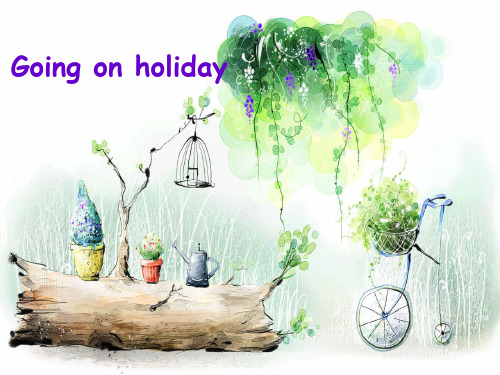
• 每日一笑
Dragon born dragon , chicken born chicken , mouse’s son can make hole !
• 每日一笑
If you want money , I have no.
If you want life , I have one .
at 4 o’clock.
Would you like some ice-creams?
No, thanks. I’ve had an icecream. I had an ice-cream at four o’clock.
I’ve already had some/ one... I haven’t / She hasn’t had any ... Have you had any…?
2021/8/23
(2) n. 背包,行李包
Her pack is cute.
2021/8/23
★ suitcase [ˈsu:tkeɪs] n.手提箱
2021/8/23
★ already [ɔ:lˈredi] adv.已经
I have had lunch already. 我已经吃完午饭了。
2.have lunch with sb. 和某人一起吃午饭
We're having lunch with John today. 我们今天和约翰一起共进午餐。
Have you had…? 你已经...了吗?
Read the 2 stories:
<Ⅰ>
He had a piece of pizza at 5 o’clock. He is full.
I had at half past twelve. CAROL:Have a cup of coffee then. SAM:I've just had a cup, thank you. I had one after my lunch. TOM: Let's go into the living room, Carol.
新概念英语第一册第83-84课课件

不要把工作留到明天才做。
Don't leave your work till tomorrow.
Game Time
死鬼
Grammar
He has already cut his hair. They have danced for 2 hours.
When are you going to have a holiday, Sam?
I don't know. I've already had my holiday this year.
Where did you go?
I stayed at home!
CAROL: TOM:
SAM:
CAROL: SAM: TOM:
Hello, Sam. __c_o_m__e__ in. Hi, Sam. We’re __h_a_v_in_g__ lunch. Do you want to have lunch with us? No, thank you. Tom. I’ve _a_l_r_ea_d__y_ _h_a_d_____ lunch. I had at half past twelve. Have a cup of coffee then. I've just ___h_a_d___ a cup, thank you. I had one after my lunch. Let's go into the living room, Carol. We can have our coffee there.
Lesson 83&84
新概念一册L83-84教学内容

CAROL: Hello, Sam. Come in.
TOM:Hi, Sam. We're having lunch. Do you want to have lunch with us?
SAM: No, thank you. Tom. I've already had lunch. I had at half past twelve.
24
SAM:Aren't you lucky! TOM:When are you going to have a holiday, Sam? SAM:I don't know.
I've already had my holiday this year. CAROL:Where did you go? SAM: I stayed at home!
Listen and answer
1. When did Sam have lunch?
2. Did he have a cup of tea / coffee?
3. What’s Carol and Tom’s living room like?
4. What are Carol and Tom going to do?
I went to the U.S.
Where did you go on holiday? I went to the beach.
Where did you go on holiday? I went to the zoo.
camera money
ticket
credit card
Listen to the tape then answer this question:
新概念英语NCE_Lesson83-84(共35页)课件

★leave
❖ ① v. 离开,出发 ❖ The train is going to leave in 5 minutes. ❖ ② v. 舍弃;脱离 ❖ John’s wife left him for another man. ❖ 约翰的妻子舍他而去,投入另一个男子的怀抱
。 ❖ ③ v. 留给,遗留;委托 ❖ ‘Leave it to me,’he said. ❖ “这事交给我来办吧,”他说道。 ❖ The famous actor left all her money to
• Let’s hold a meeting.
• untidy = messy不整洁的,凌乱的 • tidy- untidy • happy- unhappy • comfortable- uncomfortable • lucky- unlucky • like- unlike • sure- unsure • 单词前加“un”表示否定前缀
Lesson 83 Going on holiday
What do you need before you go on holiday?
suitcase
suitcase n.手提箱 /’su:tkeis/
suit 西装,套装 case 箱子,盒子
bookcase
pack /pæ k/ v. 打包
pack the suitcase 打包行李
mess n. 杂乱,凌乱的状态
1. in a mess = at sixes and sevens 乱七八糟的(状态或局面) 你的房间乱七八糟的. Your room _is__in_a__m_e_s_s___. 2. Excuse the mess. 乱七八糟,请原谅。
新概念英语第一册83-84课课件教程文件

• with sb. 和某人一起。
1.琼斯先生和他的家人在一起。 2.你打算如何处理那花瓶? 3.吉米怎么了? 4.那位长着黄头发的女士是我们的英语老师。
already adv. already 用于肯定句
1.我已经吃过早饭了。 I have already had my breakfast.
2.yet用于否定句或疑问句,表示还没有。 我还没有吃早饭。 I have not had my breakfast yet. 你吃过早饭了吗? Have you had your breakfast yet ?
① v. 离开,出发 • 火车还有5分钟就开了。 • The train is going to leave in 5 minutes. • leave sp/ leave for sp • His uncle is in Beijing. He is going to
Beijing to meet him tomorrow.
Hi, Sam. We’re having lunch. Do you want to have lunch with us? No, thank you, Tom. I’ve already had lunch. I had lunch at half past twelve.
Have a cup of ctoeffaee then. I’ve just had twa ocucpups, thank you . I had twoonebaeftfeor re my lunch. Let’s go into thelidviinnging room, Carol. We can have our ctoeffaee there.
1.All roads lead to Rome. 条条大路通罗马。
Lesson83-84(课件)新概念英语第一册

A: Look at the picture. Have you had any peas
B: Yes, I have. I have already had some peas.
A: Look at the picture. Have you had any chicken
B: Yes, I have. I have already had some chicken.
We can have our coffee _th_e_r_e_. CAROL: _E_x_cu_s_e_ _th_e_ _m_e_s_s, Sam. This room’s _ve_r_y_ untidy. We’re packing
_o_ur_ _su_i_tc_a_s_e_s. We’re going to l_e_av_e_ tomorrow. _T_o_m_ _an_d_ _I_ are going to have a holiday. SAM: _A_r_en_’_t you lucky! TOM: When are you going to _ha_v_e_ _a _h_o_li_da_y_,Sam SAM: _I_ d_o_n_’t_ k_n_o_w_. I’ve already had my holiday _th_i_s _y_e_a_r. CAROL: Where did you go SAM: I _s_ta_y_e_d_ _a_t _h_o_m_e_!
7. 屋子很乱,请原谅 8. 我不知道
1. want to do sth. 2. with us 3. I have
= I’ve 4. at half past twelve 5. after lunch 6. Let’s
= Let us 7. excuse the mess 8. I don’t know
新概念第一册Lesson83-84
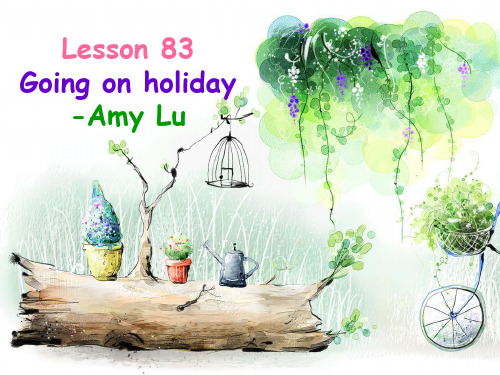
3) What are Carol and Tom going to do?
4) Where did Sam have his holiday?
CAROL: Hello, Sam. Come in.
TOM:Hi, Sam. We're having lunch. Do you want to have lunch with us?
TOM: Let's go into the living room, Carol.
We can have our coffee there.
22
CAROL:Excuse the mess, Sam. This room's very untidy. We're packing our suitcases. We're going to leave tomorrow. Tom and I are going to have a holiday.
What a mess! 真乱啊!
(2) v. 脏或乱的状态/把…弄乱 mess up 弄乱;弄糟
Don't mess up my clean floor. 别把我的干净地板弄脏了。
If you mess up you can try again. 如果陷入困境, 凌乱的,脏的
I have had lunch already. 我已经吃完午饭了。
I've already finished my homework. 我已经完成了作业。
2020/1/7
★ leave (left/left) [li:v]
新概念83-84课(第三课时1)

Yes, I have already had/eaten one. I had one after lunch.
25
I have had … 我已经吃过/喝过…
Have you had some steak ?
Yes, I have already had some. I had some at lunch.
过去式 understood stood fought brought bought caught taught felt kept slept swept left sent lent spent lost met learned/learnt paid said heard made sat found showed told
过去分词 understood stood fought brought bought caught taught felt kept slept swept left sent lent spent lost met learned/learnt paid said heard made sat found showed/shown told
n. 杂乱,凌乱
v.包装,打包,装箱
n. 手提箱
v. 离开
adv. 已经
Key knowledge
现在完成时
★ 现在完成时
主要用于以下情况
(完整word版)新概念第一册Lesson83-84知识点及拓展,推荐文档

Lesson 83-84Going on holidayCAROL: Hello, Sam. Come in.TOM: Hi, Sam. We’re having lunch.Do you want to have lunch with us?SAM: No, thank you. Tom. I’ve already had lunch.I had lunch at half past twelve.CAROL: Have a cup of coffee then.SAM: I’ve just had a cup, thank you.I had one after my lunch.TOM: Let’s go into the living room, Carol.We can have our coffee there.CAROL: Excuse the mess, Sam. This room’s very untidy.We’re packing our suitcases.We’re going to leave tomorrow.Tom and I are going to have a holiday.SAM: Aren’t you lucky!TOM: When are you going to have a holiday, Sam?SAM: I don’t know. I’ve already had my holiday this year.CAROL: Where did you go?SAM: I stayed at home!1. Hello, Sam. Come in.--come in 祈使句,表示请求或命令的句子叫祈使句。
祈使句中主语you常不出现,谓语动词用原形。
2. Hi, Sam. We' re having lunch. Do you want to have lunch with us? --We' re having lunch.现在进行时,表示目前正进行的动作。
Lesson83-84(讲义)新概念英语第一册
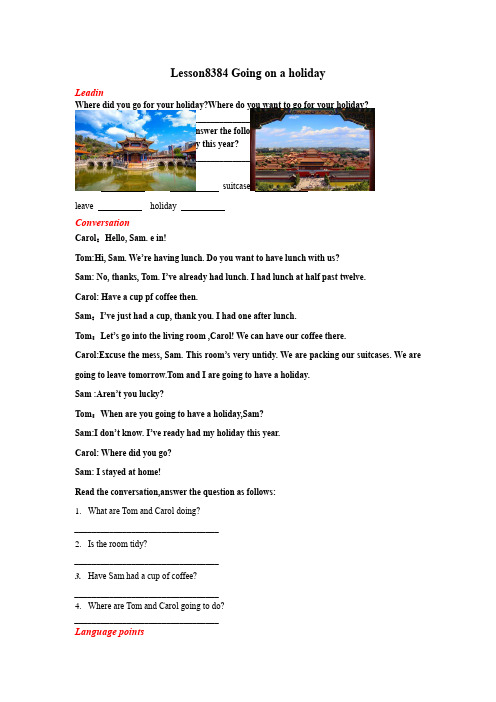
Lesson8384 Going on a holidayLeadinWhere did you go for your holiday?Where do you want to go for your holiday?____________________________________________________________________Now,let’s listen to the tape and answer the following questions:Where did Sam go for his holiday this year?____________________________________________________________________Words and phrasesmess pack suitcaseleave holidayConversationCarol:Hello, Sam. e in!Tom:Hi, Sam. We’re having lunch. Do you want to have lunch with us?Sam: No, thanks, Tom. I’ve already had lunch. I had lunch at half past twelve.Carol: Have a cup pf coffee then.Sam:I’ve just had a cup, thank you. I had one after lunch.Tom:Let’s go into the living room ,Carol! We can have our coffee there.Carol:Excuse the mess, Sam. This room’s very untidy. We are packing our suitcases. We are going to leave tomorrow.Tom and I are going to have a holiday.Sam :Aren’t you lucky?Tom:When are you going to have a holiday,Sam?Sam:I don’t know. I’ve ready had my holiday this year.Carol: Where did you go?Sam: I stayed at home!Read the conversation,answer the question as follows:1.What are Tom and Carol doing?_________________________________2.Is the room tidy?_________________________________3.Have Sam had a cup of coffee?_________________________________4.Where are Tom and Carol going to do?_________________________________Language pointse in作动词短语,含义为进来类似短语:e on 加油 e from 来自=be from翻译:加油!你可以做到的!________________________________________________Lily来自北京。
新概念英语Lesson 83-84讲义
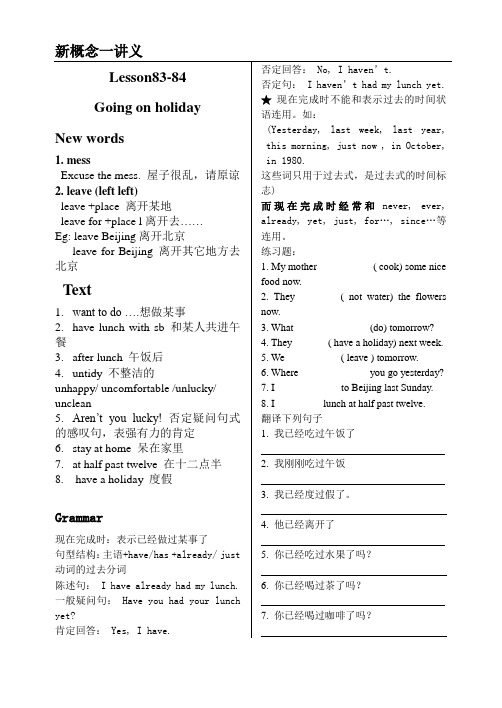
新概念一讲义Lesson83-84Going on holidayNew words1. messExcuse the mess. 屋子很乱,请原谅2. leave (left left)leave +place 离开某地leave for +place l离开去……Eg: leave Beijing离开北京leave for Beijing 离开其它地方去北京Text1.want to do ….想做某事2.have lunch with sb 和某人共进午餐3.after lunch 午饭后4.untidy 不整洁的unhappy/ uncomfortable /unlucky/ unclean5.Aren’t you lucky! 否定疑问句式的感叹句,表强有力的肯定6.stay at home 呆在家里7.at half past twelve 在十二点半8. have a holiday 度假Grammar现在完成时:表示已经做过某事了句型结构:主语+have/has +already/ just 动词的过去分词陈述句: I have already had my lunch. 一般疑问句: Have you had your lunch yet?肯定回答: Yes, I have. 否定回答: No, I haven’t.否定句: I haven’t had my lunch yet. ★现在完成时不能和表示过去的时间状语连用。
如:(Yesterday, last week, last year, this morning, just now , in October, in 1980.这些词只用于过去式,是过去式的时间标志)而现在完成时经常和never, ever, already, yet, just, for…, since…等连用。
练习题:1. My mother __________ ( cook) some nice food now.2. They _______ ( not water) the flowers now.3. What ______________ (do) tomorrow?4. They ______ ( have a holiday) next week.5. We __________ ( leave ) tomorrow.6. Where _____________ you go yesterday?7. I ____________ to Beijing last Sunday.8. I _________lunch at half past twelve.翻译下列句子1. 我已经吃过午饭了2. 我刚刚吃过午饭3. 我已经度过假了。
新概念英语第一册Lesson 83-84

Lesson 83 - Going on holiday & Lesson 84 - Have you had...?1. I’ve already had lunch. 现在完成时:have/has + done(过去分词)already 已经。
是完成时的标志词。
通常用在助动词have/has之后,实义动词之前。
2. I’ve just had a cup. 现在完成时just也是完成时的标志词。
I had one after my lunch. 一般过去时。
one代指a cup of coffee用第三人称改写:Sam has just had a cup of coffee. He had one after his lunch.3. Let’s go into the living room. 注意介词into 进去;living room 客厅。
Let’s do sth. 让我们做某事吧。
(Let祈使句)注意let’s后面要用动词原形。
let’s 包括对方。
例如:Let’s go! Let’s have some tea.let us 不包括对方。
例如:Mum, please let us play football.4. Excuse the mess. 这里的mess是个名词。
Excuse me. 请原谅…比方说,有一天Bill到Alex家去玩,可是Alex还没来得及收拾自己的房间,他就可以说这句话,来表示歉意。
5. This room’s very untidy. untidy = messy;tidy-untidy,happy-unhappyn. + y → adj. 名词词尾加y即构成形容词:wind-windy, cloud-cloudy, sun-sunny 6. We’re going to leave tomorrow. = We’re leaving tomorrow.当动词是leave, go, come, arrive等时,可以用现在进行时表将来。
新概念一册lesson83―84讲义.

Lesson 83 Going on holiday 度假Lesson 84 Have you had…? 你已经……了吗?一、Everyday English1.We generally go to the sea for our holidays.我们通常到海滨去度假。
2. They are busy preparing to go on holiday.他们正忙于筹备去度假。
3.I can't spare the time for a holiday at the moment.目前我抽不出时间去度假.二、New words and expressions1. mess(杂乱. 凌乱例如:Excuse the mess.The room is in a mess.He was such a mess that he did not know what to do. 他心乱得不知如何是好2. pack(包装. 打包. 装箱打包,装箱:例如:别忘了把镜子装起来!_______________________________________(2挤满,塞满:例如:大厅里挤满了影迷。
______________________________________公共汽车里挤满了人。
______________________________________3. suitcase(手提箱4. leave(离开✓离开,出发:例如:我准备离开意大利。
________________________________________ ✓舍弃;脱离:例如:约翰的妻子舍他而去,投入另一个男子的怀抱。
_______________________________________ ✓留给,遗留;委托: 例如:这位著名的女演员将她所有的钱都遗留给了慈善机构。
________________________________________ 5. already(已经✓already 用于肯定句我已经吃过早饭了。
新概念第一册教案Lesson83-84.docx
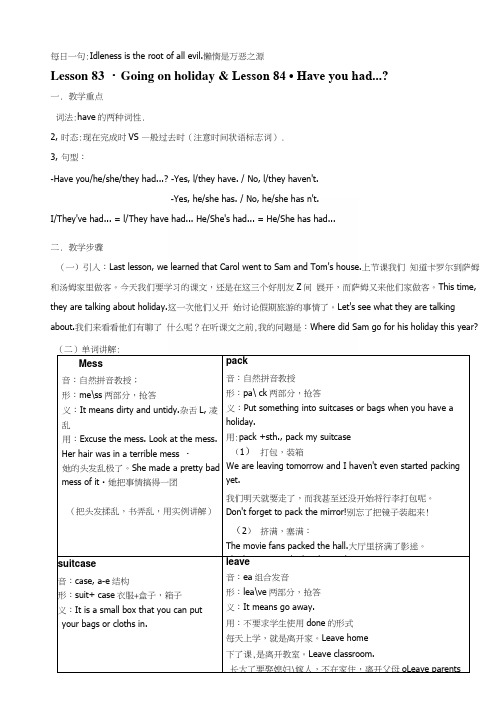
每日一句:Idleness is the root of all evil.懒惰是万恶之源Lesson 83 ・ Going on holiday & Lesson 84 • Have you had...?一.教学重点词法:have的两种词性.2,时态:现在完成时VS —般过去时(注意时间状语标志词).3,句型:-Have you/he/she/they had...? -Yes, l/they have. / No, l/they haven't.-Yes, he/she has. / No, he/she has n't.I/They've had... = l/They have had... He/She's had... = He/She has had...二.教学步骤(一)引入:Last lesson, we learned that Carol went to Sam and Tom's house.上节课我们知道卡罗尔到萨姆和汤姆家里做客。
今天我们要学习的课文,还是在这三个好刖友Z间展开,而萨姆又来他们家做客。
This time, they are talking about holiday.这一次他们乂开始讨论假期旅游的事情了。
Let's see what they are talking about.我们来看看他们有聊了什么呢?在听课文之前,我的问题是:Where did Sam go for his holiday this year? (二)单词讲解:Mess音:自然拼音教授;形:me\ss两部分,抢答义:It means dirty and untidy.杂舌L, 凌乱用:Excuse the mess. Look at the mess. Her hair was in a terrible mess ・她的头发乱极了。
新概念英语一册83-84课讲义
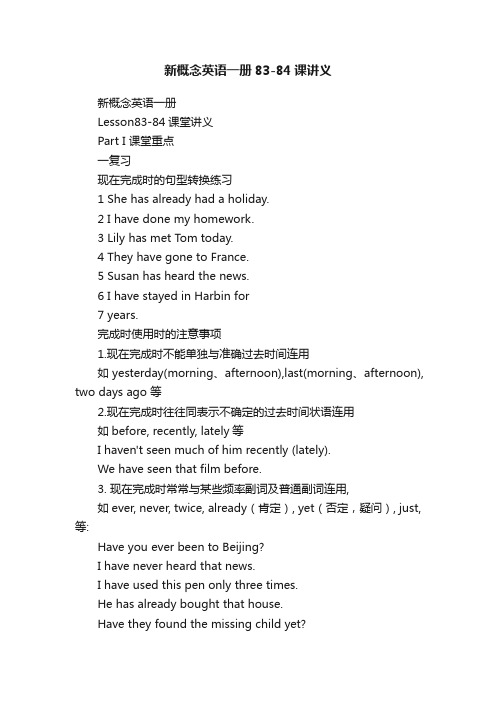
新概念英语一册83-84课讲义新概念英语一册Lesson83-84课堂讲义Part I 课堂重点一复习现在完成时的句型转换练习1 She has already had a holiday.2 I have done my homework.3 Lily has met Tom today.4 They have gone to France.5 Susan has heard the news.6 I have stayed in Harbin for7 years.完成时使用时的注意事项1.现在完成时不能单独与准确过去时间连用如yesterday(morning、afternoon),last(morning、afternoon), two days ago 等2.现在完成时往往同表示不确定的过去时间状语连用如before, recently, lately等I haven't seen much of him recently (lately).We have seen that film before.3. 现在完成时常常与某些频率副词及普通副词连用,如ever, never, twice, already(肯定), yet(否定,疑问), just,等:Have you ever been to Beijing?I have never heard that news.I have used this pen only three times.He has already bought that house.Have they found the missing child yet?4. 现在完成时还往往可以同包括现在时间在内的时间状语连用,如now, up to these few days/weeks/months/years, this week/month/year, so far等: Peter has written six books so far.二重点词汇1 never adv.决不;从来没有He never breaks his words. 他从不食言。
- 1、下载文档前请自行甄别文档内容的完整性,平台不提供额外的编辑、内容补充、找答案等附加服务。
- 2、"仅部分预览"的文档,不可在线预览部分如存在完整性等问题,可反馈申请退款(可完整预览的文档不适用该条件!)。
- 3、如文档侵犯您的权益,请联系客服反馈,我们会尽快为您处理(人工客服工作时间:9:00-18:30)。
Lesson 83 Going on holiday 度假
回答:1. Where did Sam go for his holiday this year? 2. Does Sam want to have lunch with them?
3. When is Sam going to have a holiday?
一、Key words
1.mess __________;零乱;肮脏;胡乱做,瞎做/
2.suitcase __________;套装;晚礼服
3.leave _________ ;离开某地到另一地;
动身去某处;不要干涉某人做某事/
二、Key structures
We're having lunch.Aren't you lucky! Where did you go?
三、Text
Hello, Sam. Come in. 译文:_________________ _________________
Hi, Sam. We're having lunch. Do you want to have lunch with us? 译文:______________________ ____________
讲解:介词表示与某人(某物)在一起。
No, thank you. Tom. I've already had lunch. I had lunch at half past twelve.
译文:________________________________ __
讲解:现在完成时陈述句。
表示我已经吃过午饭了,对现在的影响是我不想再吃了。
为标志性状语,一般放在助动词后面。
Have a cup of coffee then. I’ve just had a cup, thank you. I had one after my lunch.
译文:____________________ ______________ Let's go into the living room, Carol. We can have our coffee there.译文:________________________
讲解:这是一个祈使句。
let’s 是let us的缩写。
走进;反义;注意:若是使用了into 或者out of的时候,其后肯定跟有名词或名词词组,不能什么也不跟。
但是如果go in/come in 或者go out/come out 则其后可以不跟任何成分。
Excuse the mess, Sam.译文:________ ________________
讲解:原句=
This room's very untidy. 译文:____________ _______
We're packing our suitcases. 译文:______________________ ____________
We're going to leave tomorrow. 译文:___________________________ ___
Tom and I are going to have a holiday. 译文:____________ __________
Aren't you lucky!译文:_________ ________________
讲解:否定疑问句的回答:如果答语是肯定的,就用yes,否定的,就用no。
这种答语的汉语译法有特殊之处。
如:Don’t you know English? 你不懂英语吧?Yes, I do. 不,我懂。
When are you going to have a holiday, Sam? 译文:_________________________ ______
I don't know. I've already had my holiday this year. 译文:_________________________ _________
Where did you go?译文:________________ _ _________________
讲解:一般过去时的特殊疑问句。
Where + 助动词+ 主语+ 动词原形
I stayed at home!译文:____________________ _______ _______
四、Grammar focus
(1)在英语中,现在完成时主要用于以下两种情况:
①表示在过去不确定的时间里发生的并与现在有着某种联系的动作;
②表示开始于过去并持续到现在的动作。
(本课中萨姆所面临的是第1种情况,正是因为他吃了饭,喝过了咖啡,也休
过假,因此他谢绝了汤姆的邀请,并表示今年已无可能再次休假。
)
(2)现在完成时在汉语中常用“了”、“过”或“已经”来表示。
(3)现在完成时由助动词have(has)+动词的过去分词构成。
has用于第三人称单数,have用于其他各种人称.
否定句:主语+have/has + not+过去分词+其他. 一般疑问句:Have/Has+主语+过去分词+其他.
简略答语: Yes, 主语+ have/has.(肯定) No, 主语+ haven't/hasn't.(否定)
(4)一般现在完成时通常与表示不确定的时间副词或短语连用如just, already, before, never, ever, twice, three times等。
五、Background knowledge
在欧洲,休假是天大的事。
最为重要的是,休假的传统已经成为一种价值观,深植于人们的心中。
工作狂在其他地方被视为“成功人士”,但在欧洲或许就被看成一个乏味无趣、不懂生活的人。
因此,尽管法、德等欧洲国家因为经济迟缓、劳动力缩减,不断有人呼吁要减少休假、增加工作时间,但要实现起来难上加难。
而且,欧洲国家的工会组织特别强悍有力,雇主如果要减少员工的休假和福利,几乎是寸步难行。
“不会休息,就不会工作。
”一位在英国生活的中国女孩这样对记者说。
她和先生每年有一个月的假期,“虽然伦敦的生活节奏相对比英国其他地方要紧张许多,但每年伦敦人都雷打不动地去度假。
给我感觉是,英国人好像一天到晚老在休假。
”即使是在休假观念没有欧洲那么强的澳大利亚和美国,人们也非常重视工作和生活之间的平衡。
澳大利亚的公务员辛迪告诉记者,她所在的部门会将各个员工的休假情况在电脑里列成单子,如果有人逾期不休假,他/她的名字就会从电脑系统中自动弹出,而老板就会找这个“黑名单”上的人谈话,要求他/她休假。
“有统计说,不休假的人生产力会下降,而且容易对工作厌倦,因此多数的雇主都会鼓励员工休假。
”辛迪说。
在生活节奏相对较快的美国,人们开始反省休假缩减的趋势给美国带来的消积影响。
据美国劳工部统计,超过三分之一的美国人没有休完他们的假期,有二成的雇员一年内没休过年假。
因此,每年多出的工作天数有5.74亿天——美国人认为,这是一个很可怕的数字。
美国媒体指出,不断减少的休假,使美国人的劳动强度已经等同于中世纪时期的水平,美国人因此工作压力越来越大、健康问题越来越突出。
六、Recite the dialogue。
